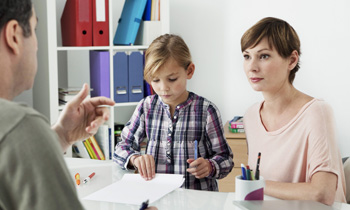
Families come to us to gain valuable information and support tailored to their child’s needs. We are dedicated to assisting families with finding resources and treatment options that are suitable for their individual needs. We offer expert assessment, diagnosis, consultation, and intervention for childhood behavior and learning challenges. Our goal is to identify your child’s strengths and weaknesses and to develop a plan for intervention. Beyond this, we provide recommendations for pediatricians, schools, teachers and other related professionals, depending on the needs and desires of both child and family.
Our approach to child psychotherapy combines an understanding of family dynamics with a cognitive behavioral skill-building approach. This allows the family to join together in a healthy way to support the child or teen in treatment.
We specialize in play therapy when engaging with younger children or those facing developmental challenges. This technique uses a wide variety of treatment methods and allows the child to express his or her feelings unconsciously. For children with ADHD or similar needs, we utilize an active age-appropriate approach, including the use of games and other play activity to maintain a child’s interest and motivation for change. Our child psychologists and therapists lead a variety of social skills groups tailored to children ages 7-11. They also provide specialized coaching to meet the developmental needs of this age group.
Our Goal
Our assessments aim to determine your child’s unique strengths and areas of weakness. Accurate assessments can then guide treatment, provide in-school accommodations, and offer solution-focused recommendations for real change.
Top Child Psychologist
Successful treatment begins with a strong bond between the therapist and the child. We believe this is the core ingredient for real change. Our therapists work hard to establish a good rapport with your child, making sure they feel understood and supported from the outset.
At The Sachs Center, we offer high-quality neuropsychological assessments at competitive rates. Our complete neuropsychological assessments enable us to fine-tune diagnosis. This documentation equips school officials with critical insight into the challenges your child may be facing.
Play Therapy
Play therapy with very young children can indicate how children are coping with their problems or concerns. Additionally, it can show how much children understand what is happening around them or within themselves. The natural play of children has long been acknowledged as a form of communication.
During play therapy, children are given the freedom to explore their feelings through their natural method of learning. They use specially selected tools such as drawing or building to play out their feelings, thoughts, and concerns. Children can gain insight into their own abilities, limitations, and social rules, all while learning the difference between fantasy and reality.
Playing in a therapeutic environment is different from playing with siblings, friends, parents, or other family members. Here, children play at their own pace and with their own agenda. The session becomes a time for the child to experiment with change, where they learn about choice, self-responsibility, and self-direction, all the while improving their social skills and resolving emotional difficulties and inner conflicts.
Feedback from parents is an integral part of the play therapy process, as parents can inform the therapist about changes at home. This technique has proven to be effective with children who are experiencing social, emotional, behavioral, and learning problems such as anxiety, aggression, depression, ADHD, impulsivity, low self-esteem, social withdrawal, and post-traumatic stress.
At the Sachs Center, we are committed to fostering each child’s emotional and social development.

